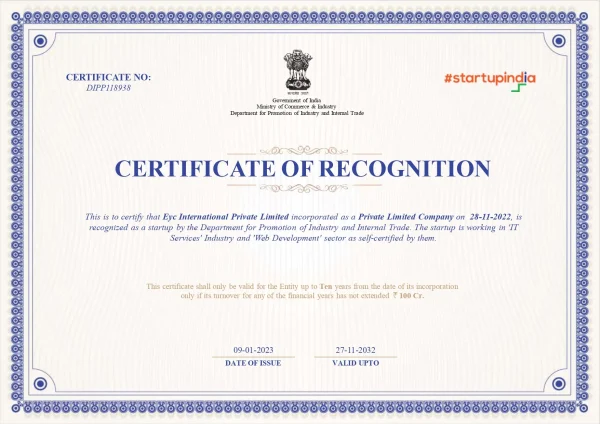Description
Details
- Price Only ₹4,999
- Slogan Power to Empowers
- Brand color
- Color Red
- Listing categories Service / Legal Services
- Location / Region Maharashtra/ Mumbai Central/ Mumbai
Location
Contact
- Person Asim Patel
- Phone 7891007892
- E-mail eycintl@gmail.com
- Address Suite #1 Patel House Near Govt. Rest House Pen 402107
Office Details
- Website https://www.eycinternational.in
- WhatsApp 7066033555
FAQ
- Who can register with Startup India?
- An entity incorporated as a Private Limited Company, Partnership Firm, or Limited Liability Partnership can register themselves under the Startup India scheme. The annual turnover of these business entities should not exceed 100 crores, and they should have been in existence for up to ten years from the date of their incorporation/ registration. Such an entity should be working towards innovation, development, or improvement of products or services, or processes.
- What are the benefits of signing up with Startup India?
- There are several benefits that Startups can receive from the Startup India Scheme. However, in order to avail of these benefits, an entity needs to be recognized by the DPIIT as a startup.Startups are allowed to self-certify their compliance with six labor laws and three environmental laws. This is allowed for a total period of five years from the date of incorporation/registration of the entity. Startups are allowed a three-year tax exemption and the best intellectual property services and resources are solely built to help startups protect and commercialize their IPRs.
- What kind of business structure should I choose for my startup?
- The most preferred business structures for a startup are Private Limited companies and LLP''s. A Private Limited company is legally recognized and generally favored by investors. However, it has stricter compliance and may have a higher cost of incorporation.Whereas incorporation cost is lower for LLPs and they tend to have relaxed compliance in comparison to Pvt. Ltd. Co. In addition to that, LLPs have limited liabilities and are equally recognized by investors all over the world.
- What can I do to attract investors for a start-up?
- To attract investors, not only do you need a stellar product with a scalable model, but you also need visibility. Make sure that your product receives healthy engagement and traction. You’ll need to register your startup on Startup India and proactively seek out investors. Make sure you can effectively communicate your business idea to the investor and the sustainability of your business model.
- Can a foreign company register under the Startup India hub?
- Any entity that has at least one registered office in India can register itself on the hub, since the location preferences, for the time being, are only created for Indian states. However, soon the government hopes to start registrations for stakeholders from the global ecosystem too.
- What is the difference between an accelerator and an incubator?
- Startup incubators are typically institutions that help entrepreneurs develop their businesses, especially in the initial stages. The incubation function is usually carried out by institutions that have experience in the business and the tech world.Startup accelerators support early-stage, growth-driven companies. These programs usually have a timeframe in which individual companies spend anywhere between a few weeks and a few months working with a group of mentors who are educated and may also provide financial help.
- For how long is a company recognized as a startup?
- Any business entity that has completed 10 years from the date of its incorporation/registration, and has exceeded the previous year's turnover of 100 crores shall stop to be a startup on completion of 10 years from the date of its registration/incorporation. Can an existing entity register itself as a “Startup” on the Startup India Portal? Yes, as per the law an existing entity can register itself as a startup, provided that it meets the prescribed criteria for a startup. They will also be able to avail various tax and IPR benefits that are available to startups. The criteria are the same as those mentioned in the article above. Once the application is complete, and the startup gets recognized, you will receive a system-generated certificate of recognition. You will be able to download this certificate from the Startup India portal.
- How do I know my registration is complete?
- Once the application is complete, and the startup gets recognized, you will receive a system-generated certificate of recognition. You will be able to download this certificate from the Startup India portal.
4 reviews on “Startup India Registration”

cognomi con la d
•I love the efforts you have put in this, appreciate it for all the great blog posts.

buletin online
•I got what you mean , thanks for putting up.Woh I am delighted to find this website through google.

mantenimiento woocommerce
•Great write-up, I am regular visitor of one¦s web site, maintain up the nice operate, and It is going to be a regular visitor for a lengthy time.
https://pixelfactory.es/mantenimiento-web-wordpress-woocommerce/

Danielle Hebb
•Wow! Thank you! I constantly wanted to write on my website something like that. Can I include a part of your post to my website?
 Startup India Registration
Startup India Registration 






Post New Review